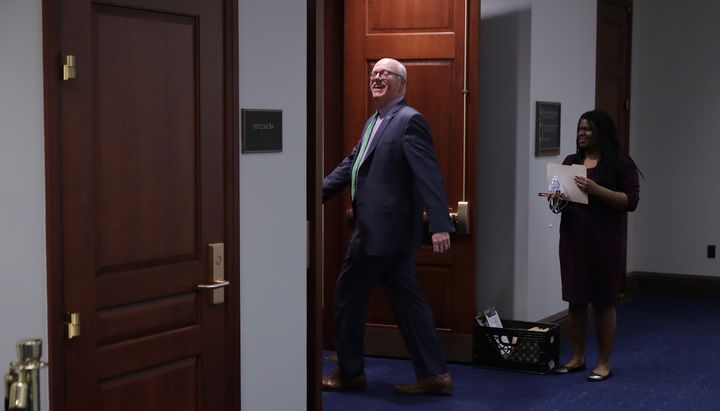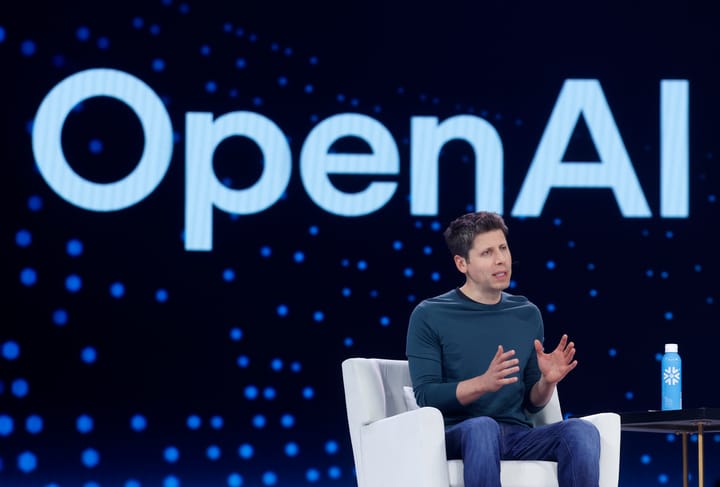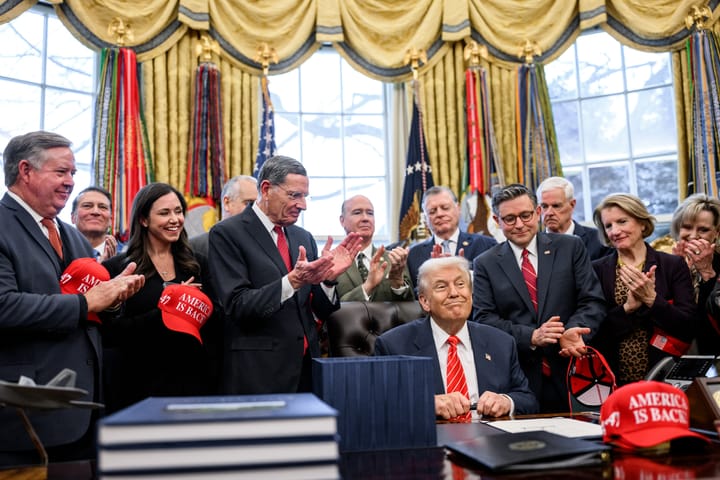This op-ed was authored by Sludge's co-founder.
The record $2.2 trillion bailout passed by Congress last week demonstrates the sheer power of lobbying: In the face of mass unemployment and a small business extinction event, large corporations emerged with the lion’s share of the funding.
Overall in the third coronavirus bailout bill, big corporations get access to a pool of public funding that’s larger than the total made available for small business loans, and nearly one-and-a-half times the total of the relief checks that some individuals will receive. The weeks before the bailout’s passage were a “feeding frenzy” for lobbyists and “gold rush” for well-connected industries.
The biggest bucket in the response is $504 billion in grants, loans, and loan guarantees, consisting mostly of $425 billion to capitalize a new Federal Reserve program for big businesses and local governments. To qualify for a loan, corporations’ debt must be classified as “investment-grade”; this requirement tilts the scales towards already-big businesses, as it rules out companies currently or imminently rated lower by the bond market. Private equity industry lobbyists weighed in directly on the structure of this biggest fund, which will be overseen by Treasury Secretary Steve Mnuchin with a “sweeping amount of latitude.”
Small businesses are supposed to eventually receive $377 billion in aid and some taxpayers will receive one-time checks of up to $1,200, sending out $290 billion. The remaining hundreds of billions go towards expanded unemployment benefits, health programs, aid to states and cities, food stamps, airline industry bailouts, and just for good measure, $10 billion in personal tax cuts. The package’s top-line total comes in at at least $6 trillion, maybe as much $10 trillion, because the Fed’s $425 billion in new loans can be leveraged ten times over, for $4.25 trillion in available financing.
The top-heavy bailout is yet further evidence that corporate lobbyists and policy influencers have captured the U.S. Congress—it seems clear that no emergency relief is currently possible without even greater corporate giveaways.
In its design, Sen. Mitch McConnell’s (R-Ky.) aid package failed at least four of five key tests laid out by the Roosevelt Institute, a progressive economic think tank: its one-time checks of $1,200 to taxpayers are inadequate, the small business relief will arrive too late, the Fed’s fund lacks effective oversight, and the $150 billion in funding for state and local governments is widely seen as too low and will require a chaser. The bailout doesn’t even touch the enormous problems of lost employer-sponsored health insurance, emergency rental and mortgage assistance, student loan debt, broadband access during stay-at-home orders, and much more.
A recent poll by the Economic Security Project and Data For Progress found that 94% of voters believe the stimulus should be sent directly to Americans, rather than large corporations.
Tucked throughout the 800-page bill are corporate giveaways, some still to be discovered, some known: $170 billion in tax benefits to wealthy real estate investors, $58 billion in aid to airlines that funneled billions into stock buybacks instead of investments, a reduction in capital requirements for community banks, a provision for for-profit colleges to keep funding even after students need to drop out for COVID-19 reason, and crucially, a provision for sunscreen innovation in McConnell’s home state of Kentucky.
The unprecedented economic crisis facing wage-earners when compared with the top-heavy corporate relief package prompts the question: Is there any realistic way the current 116th U.S. Congress could have passed a more targeted and effective relief bill, without record subsidies for heavy-lobbying industries? Is the current U.S. Congress capable of a public-first response to a public health emergency, say, one that would have continued to pay wages during the stay-at-home window, as France, Germany, Denmark, and Britain have done? If public aid without an equally massive corporate bailout is unimaginable, what does that say about the state of U.S. representative democracy? After all, such a Fed-guaranteed $425 billion loan program launched anytime in the past decades could have helped capitalize productive investment on any number of economically-valuable infrastructure or health care fronts—for example, renewable energy programs to mitigate the global climate crisis.
The no-strings-attached bailout is yet further evidence that corporate lobbyists and policy influencers have captured the U.S. Congress, especially the Senate. After all, the major legislative outcome of the previous Republican-controlled Congress, the 2017 Tax Cuts and Jobs Act, by its final year in 2027 gives 83% of its benefits to the wealthy, causing 53% of Americans to pay more in taxes. The TCJA’s stated ten-year cost of $2.3 trillion will not in fact pay for itself; the total ten-year gross cost—even before the latest stock market crash—might be $10 trillion, with a net cost of $5 trillion. Were these tax breaks productive, at that immense cost? In 2018, stock buybacks topped a record $1.1 trillion, with companies gobbling up tens of billions of dollars worth of their own stock, including airlines that now need to be bailed out.
But there is encouraging movement on popular and much-needed lobbying reforms. The Democratic H.R. 1, the For the People Act of 2019, passed the House in March 2019, by a vote of 234 to 193. (The bill stands virtually no chance of advancing in the current GOP Senate. It was largely opposed by K Street lobbyists, business associations, and conservative groups.) Polling found that 75% of 2018 voters in battleground House districts named cleaning up corruption as a top priority, and H.R. 1’s sweeping ethics reforms were supported by over 145 organizations in the Declaration for American Democracy.
The need for a more comprehensive definition of lobbying was proven in the wake of a previous lobbying reform, 2007’s Honest Leadership and Open Government Act, which toughened disclosure requirements but resulted in lobbyists moving more of their activities into the shadows. A Politico analysis in 2016 found that of the 352 people who had left Congress since the law took effect, 47 percent joined the influence industry, but only slightly more than half of them registered as lobbyists. (In the six year period before 2008, Public Citizen found that 43 percent registered as lobbyists.)
H.R. 1 would give the Office of Government Ethics greater oversight and enforcement powers, and it would implement stronger lobbying registration requirements. Public Citizen highlighted these key reforms in July 2019: “The measure would expand the threshold of lobbyist registration under the Lobbying Disclosure Act to include counseling services on behalf of a lobbying campaign, with or without lobbying contacts. This would bring strategic consulting and lobbying activity under the federal revolving door restrictions.”
However, at the federal level, the cooling-off period requiring former members of Congress to wait before lobbying their former colleagues is currently just one year for former House members and two years for former senators. One year, Public Citizen notes, is certainly too short, not allowing for even one legislative session of possible staff turnover. And former lawmakers can lobby other parts of the government immediately after retiring from Congress. Some states have recognized this as an area to tighten up reforms—in January, the Florida House advanced a six-year ban for former legislative and executive officials.
The endemic problems of revolving-door lobbying, where industries and special interests employ former members of Congress and Hill staffers to lobby on their behalf, has been studied for decades. Washington D.C.’s lobbying culture was examined in political scientist Lee Drutman’s 2010 book, “The Business of America is Lobbying: How Corporations Became Politicized and Politics Became More Corporate.” Last July, a Pew Research survey identified declining ethics in government as an underlying issue behind “partisan paralysis in government and the outsize influence of lobbyists and moneyed interests,” deemed major problems.
K Street is willing to pay lobbyists with a former government staff position almost three times what those without such experience earn, and as a corollary, revolving door lobbyists earn a premium in the revenue they generate for their firms. A 2010 study found that lobbyists with experience in a U.S. Senate office, in turn, suffer a 24% drop in revenue when their former boss leaves office.
In a 2019 report for the Center for American Progress, two authors identify further measures to firmly shut the revolving door: a lifetime lobbying ban on members of Congress and a five-year ban on their senior staffers. Last year, nine retiring or defeated members of Congress moved right into the influence industry, and at least 176 former members of Congress moved to the influence industry over the past decade.
A 2011 study on financial industry lobbying from two International Monetary Fund economists found that “if a lobbyist had worked for a legislator in the past, the legislator was very likely to vote in favor of lax regulation.” The effects of lobbying can be seen in the failure of bipartisan measures to reduce the price of prescription drugs, to the bailout for heavy-lobbying Boeing and the commercial airline industry, to inefficient economic growth, even to insecure elections run by untested voting machine companies.
Looking ahead to the next session of Congress, reformers can advocate to Democratic Party leaders that H.R. 1 is a floor, not a ceiling, for adequate ethics rules in a responsive and trustworthy government. A lifetime lobbying ban was recently proposed by the presidential campaigns of Senators Michael Bennet, Bernie Sanders, and Elizabeth Warren, and last year formed the basis for common ground between progressive Rep. Alexandria Ocasio-Cortez and conservative Sen. Ted Cruz. Its detractors say a lifetime prohibition would be challenged in courts, but federal law already prevents former agency officials from lobbying their past offices on specific issues. The question for future Congresses will be whether to accept this strong medicine to restore trust in a government responsive to the people.
Many areas of federal law and policy making could stand to have their independence bolstered—for example, companies that receive public subsidies could be prohibited from certain lobbying activities, or the federal government could establish an Office of Public Lobbying to represent the public interest. While progress builds on these fronts, the next H.R. 1 legislation offers a vehicle to firmly close the revolving door by including lifetime bans for former congresspeople and five-year bans for senior staff.
Squarely addressing the problem of the revolving door can help ensure that taxpayer funds are used effectively and equitably, and that the biggest corporate players are accountable for their own reckless behavior. To avoid another gargantuan bailout weighted towards wealthy corporations and private equity interests, a lifetime lobbying ban for members and five-year rule for Hill staff would give H.R. 1 the strength of the public trust in countering corporate power.



